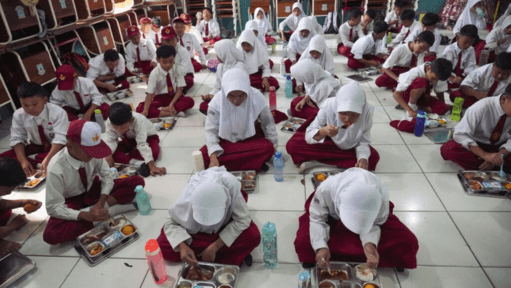
Indonesia: $4.3 Billion Free-Meal Programme Launched to Combat Stunting Targeting schoolchildren and pregnant women
Ambitious Nutrition Initiative Rolled Out Nationwide
Indonesia has launched a $4.3 billion free-meal programme, fulfilling a key election promise of President Prabowo Subianto. The initiative is designed to address malnutrition and stunting, a condition affecting 21.5% of children in the Southeast Asian country. The programme, announced on Monday, January 6, 2025, is a historic step toward improving the quality of life for millions of Indonesians.
Who Benefits from the Programme?
-
Target Groups: Schoolchildren, toddlers, pregnant, and breastfeeding women.
-
Reach: By 2029, the programme aims to serve 83 million people nationwide.
-
Budget: A total allocation of 71 trillion rupiah ($4.3 billion) has been earmarked for 2025.
How the Programme Works
The government has set up at least 190 kitchens run by third-party catering services, including military bases, to prepare and distribute meals. Each meal costs 10,000 rupiahs (62 US cents) and includes rice, protein, vegetables, and fruit.
Presidential spokesman Hasan Nasbi said:
"This is historic for Indonesia, marking the first nationwide nutrition programme for toddlers, students, and mothers."
Stunting Reduction Goals
The programme aims to reduce stunting—a major health issue that can lead to impaired cognitive and physical development—from 21.5% to 5% by 2045.
International Funding Support
President Prabowo secured significant funding for the programme and other initiatives, including a $10 billion deal with Chinese leader Xi Jinping in November 2024. He also engaged with leaders in the United States and the United Kingdom to gain additional support.
Criticism and Sustainability Concerns
Despite its ambitious scale, public policy experts have expressed doubts about the programme’s long-term sustainability.
Aditya Alta from the Centre for Indonesian Policy Studies commented:
"Economically, it's not sustainable if the central government shoulders everything. Stunting is a multidimensional issue and addressing it through just one approach is insufficient."
Similar Efforts in the UAE and Globally
UAE’s Supportive Nutrition and Health Initiatives
The UAE has consistently emphasized nutrition and health as part of its public welfare programs, particularly for children. Initiatives such as school lunch campaigns and community health projects aim to improve quality of life and address nutritional gaps.
Global Examples of Nutrition Programmes
Countries like Brazil, India, and Kenya have implemented similar large-scale nutrition programmes targeting malnutrition and stunting. However, sustainability and impact often hinge on robust local partnerships and diversified funding sources.
A Global Lesson in Nutrition and Development
Indonesia's programme highlights the importance of addressing malnutrition at scale. While challenges remain, such efforts demonstrate how targeted interventions can potentially improve the lives of millions and reduce stunting rates, aligning with broader global health and development goals.
For any enquiries or information, contact info@thelawreporters.com or call us on +971 52 644 3004. Follow The Law Reporters on WhatsApp Channels